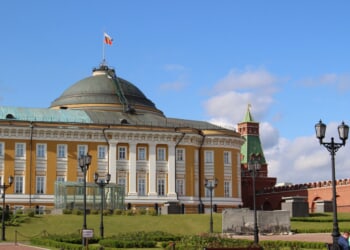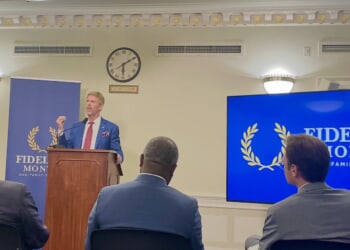Richard Holden is a former Party Chairman and is the MP for Basildon
I never thought I’d end up leading a campaign to ban cousin marriage, not least because like so many, I was unaware of its prevalence and impact.
In parts of the country, and within certain groups, namely parts of the British-Pakistani, and to a lesser degree the traveller, communities it is common and it is not incidental. Indeed, it has become entrenched over generations, normalised by tradition, and too often left unchallenged by those in positions of power fearful of ‘taking on’ these particular communities.
That silence has not been a passive but a conscious choice that has allowed harm to persist unaddressed. After years of campaigning, professional warnings, and slowly mounting public concern, the Government is finally being forced to face what many on the left – and too many on the right – would still prefer to ignore.
It astonishes me that – despite a plethora of evidence pointing firmly to its connection to diminished individual liberty, social fragmentation, and poor health outcomes – some suggest speaking about cousin marriage is an act of cultural insensitivity at best and at worst divisive vitriol born out of prejudice and racism.
This is not just deeply wrong but dangerously back-to-front.
It is not racist to support reform, it is racist to accept a system that denies young and vulnerable people genuine freedom in their most intimate relationships. It is racist to assume that British-Pakistani families should be forced through fear of offending the patriarchal leaders to tolerate social conditions and health risks that we would not accept for anyone else. And it is racist to tell girls and boys born in Bradford or Luton that their futures must be determined by bloodline and birth order rather than their choice.
Interestingly, a recent YouGov poll showed that even a majority of those from Pakistani and Bangladeshi communities want it banned. Surely, racism lives deeper in those who continue to prop up a practice the majority of the community they’re pretending to support are actually opposed to.
The accusations of bigotry aimed at those of us raising this issue are not new. They mirror the tactics used in response to the grooming gangs scandal, where those who dared to speak out were smeared, sidelined, and silenced.
We now understand that many of the worst failures in that scandal were not random or opportunistic but rooted in tightly knit extended family structures. Offenders were often linked not just by friendship but by blood: brothers, cousins, and uncles bound together by obligation, secrecy, and a shared instinct to protect their own.
When extended families are intermarried and interdependent, the instinct to cover up wrongdoing becomes almost automatic. This is not an unintended side-effect but structural. It suppresses disclosure, discourages accountability, and allows abuse to flourish unchecked. That is why silence on cousin marriage carries such far-reaching consequences.
And yet, as we’ve seen so clearly this week, the core truths of that scandal can no longer be ignored. The Government’s decision to launch a statutory national inquiry did not come because the system worked. It came because victims, long dismissed, found their voices. Because the truth was hollered from rooftops and hammered against closed doors. It didn’t emerge through process or pen-pushers, but through relentless and sustained pressure.
That same failure of leadership is evident in how cousin marriage has been handled. For too many, cousin marriage remains too often the norm rather than the exception. In some areas, more than half of all mothers of Pakistani heritage are married to a first or second cousin. This is not a private matter between two consenting adults. These arrangements are often determined years in advance, enforced through familial obligation and defended with reference to culture or tradition. The pressure to conform is immense and, for many, refusal carries serious social consequences.
Last week, in Parliament, I led a Westminster Hall debate on this issue and referred to the Bill I have recently introduced to the House, the Marriage (Prohibited Degrees of Relationship) Bill. Its aim is simple: to restore a prohibition that stood for centuries in English law. It ought to be stressed that this is not some radical or fashionable new idea, but a straightforward reform that would bring the UK into line with other liberal democracies, such as Norway and Denmark.
In areas where cousin marriage is widespread, real choice is often limited, coercion becomes normalised, and social mobility begins to erode. When marriage, employment, and even dispute resolution are kept within the extended family, engagement with wider civic life suffers. Trust in public institutions weakens, integration stalls, and opportunities shrink. From that vacuum emerges self-appointed gatekeepers: unelected, unaccountable, and hellbent on preserving a system that serves the few while holding back the many.
A modern state should not endorse systems that limit freedom, worsen public health, and reduce social trust, especially when the law has an obvious role in signalling what is acceptable and what is not.
Cousin marriage is not a private matter when it affects entire communities and generations. Those calling for reform are not outsiders meddling in someone else’s culture but often members of the very same communities, tired of watching suffering mislabelled as heritage.
Parliament exists to serve the public, not to protect those who benefit from keeping people quiet. If we are to believe in liberty, fairness, and public responsibility, we must be prepared to confront difficult questions. And we must never be afraid to put the interests of the vulnerable above the comfort of those served by the status quo.


![Former Bravo Star Charged After Violent Assault Using a Rock-Filled Sock in Tennessee Walmart [WATCH]](https://www.right2024.com/wp-content/uploads/2025/07/Former-Bravo-Star-Charged-After-Violent-Assault-Using-a-Rock-Filled-350x250.jpg)



![Karoline Leavitt Levels CNN's Kaitlan Collins and Other Legacy Media Reporters [WATCH]](https://www.right2024.com/wp-content/uploads/2025/07/Karoline-Leavitt-Levels-CNNs-Kaitlan-Collins-and-Other-Legacy-Media-350x250.jpg)
![Man Arrested After Screaming at Senators During Big Beautiful Bill Debate [WATCH]](https://www.right2024.com/wp-content/uploads/2025/06/Man-Arrested-After-Screaming-at-Senators-During-Big-Beautiful-Bill-350x250.jpg)









